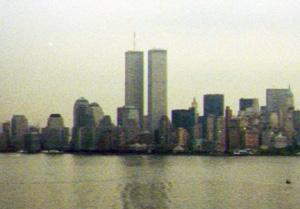
By Barb Arland-Fye
Twenty-one months before Sept. 11, 2001, became a day in infamy I was working at a daily newspaper participating in team coverage of Y2K. Remember Y2K? We all worried whether we’d live to see Jan. 1, 2000, because of a glitch in major computer applications worldwide.
But our greatest fears were set aside shortly after midnight. I remember coming home from my assignment in the wee hours of Jan. 1, 2000, and turning on the TV to watch New Year’s Day celebrations around the world. It was reassuring to see celebration and not obliteration.
Relieved, we settled back into comfortable lives oblivious to the resentment percolating in impoverished countries where people were focusing on how they’d get their next meal rather than technological doomsday. The terrorism brewing in these places of deprivation would become our greatest fear yet.
I remember walking into the newsroom the morning of Sept. 11, 2001, and being filled with a sense of dread: every television set was on, with reporters and editors clustered around them. Smoky clouds billowed around the World Trade Center. Reporters and editors gathered for a planning meeting and then headed out to cover this story of unimaginable terrorism and its implications for our community and beyond.
One year later, “Catholic Trends,” a publication of Catholic News Service, reported that Church leaders in homilies and public statements marking the anniversary of Sept. 11, 2001, spoke of “the need to address the root causes of terrorism and the right way to go about conquering terrorism.”
The article (Sept. 14, 2002) quoted Bishop Kenneth Angell of Burlington, Vt., who said, “We must learn how to love our enemies as Christ commanded.” His own brother and sister-in-law were on one of the jets that crashed into the World Trade Center that awful day. The bishop said, “We must learn to pray … (and) as we work on how to conquer our enemies with love, we will be working our way to a new world, not only on this earth, but to an eternal world where good truly reigns.”
The nation’s bishops were greatly concerned about the U.S.’ determination to wage a war on terrorism. “… Our faith calls us to find the right ways to seek justice, to be peacemakers, and to protect the life and dignity of all in a world broken by terror and disrespect for human life,” said the U.S. Conference of Catholic Bishops’ Administrative Committee.
Sadly, our government chose to go to war, first in Afghanistan and later in Iraq. Thousands of lives have been lost and thousands more have been maimed, seriously and permanently injured. Yet, the elusive terrorists are still eluding us.
Now there’s furious debate over whether a Muslim community center and mosque should be allowed to be built a few blocks from where the World Trade Center was destroyed. Amidst the rancor, however, Catholics and other Christians, Muslims and Jews have steadfastly gathered for dialogue, for peace and understanding in homes, churches, synagogues and mosques in our diocese and beyond.
Talia Alvi, a Quad-City Muslim, called the other day to extend an invitation to the people of the Davenport Diocese to participate in an interfaith memorial service from 5-6 p.m. on Sept. 11 at the Masjid al-Ihsan (mosque) at 6005 34th Ave. in Moline, Ill. In a follow-up e-mail, her invitation states that “leaders of diverse faith communities will share reflections and prayers and will issue a joint statement in the midst of the current, tense political climate.”
Not by coincidence, Talia is one of the designers of a Muslim-Christian dialogue series being held Sept. 20 and 27 at the Moline mosque. She’s been part of the annual dialogue since it began five years ago.
“I think that’s what all human beings should do, is reach out and try to understand people who are different than themselves,” she said. “Without true understanding, there can’t be respect.”
But Talia, a first-generation immigrant, has been reaching out to others of different faiths and cultures since before Sept. 11, 2001. “It’s really important to learn about each other. We enrich our lives,” she told me.








